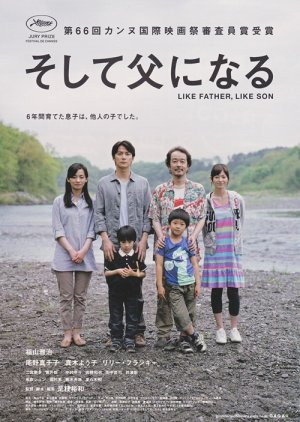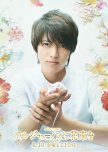
The cast from the children to the adults was amazing. The pace was slightly slow but it's forgiving because at the end, I wish the movie was longer. I wanted to see more.
My problem with this movie is that I wish they would have done it though all point of views rather than from the job-orientated father. I wanted to know how the other father felt; I wanted to know how his biological child felt; both mothers; the other children; and etc--not just pieces.
I wish the director could come out with a box series of their point of view but ultimately I know why he chose to portray the movie through the job-oriented dad: family is first and in the aspect that blood isn't always family.
Powerful film. Great performance from the cast. Again, left me wanting more.
Was this review helpful to you?

The movie is slow, but it is so realistic that you feel you're not watching a movie. I love how the family handles the situation and how the parents realize about themselves when they exchange the child.
IF you don't like a slow artsy movie then it's not for you.
IF you want something different then it's for you.
IF you want to relax and stop thinking about your daily work then it's for you
I don't cry in this movie..this is NOT a tearjerker movie...but the effect will last long.
The scene when a father was holding a camera and browsing at the pictures taken by his 6 yr old former son is what HITS me.
[ koreeda style is this......he will make you walk calmly slowly THEN a f*cking truck
came and hit you in the end, the damage will stay with you for months ].
Check my Blog for other reviews & other JDramas stuffs. (。◕‿‿◕。)
https://thatjapanesedramaguy.blogspot.com/
Was this review helpful to you?

Like Father, Like Son is bittersweet tale that is jarred with the power and emotional bond of family. It takes into question: what makes a family? Is it blood or is it the bond? Is blood truly thicker than water? Swapped children is nothing new, it's a trope. But what Koreeda does is look into this issue in detail, explore it, strip its characters bare and allows the viewer to experience (and question) the responsibilities, the decisions and the identities made/done in the film.
It is a dramatic film but not one that drowns you in useless melodrama, not one that forces you to cry and not one that feeds you with cheesy lines as family. But instead, there is rawness, there is delicate emotions portrayed and more importantly, there is realness.
Again, Koreeda channels extraordinary young talents with the two boys -- Keita and Ryusei. Not only does the contrast between the two complement their differences but it also intensifies the differences of the two families. How will a carefree boy adapt to an independent, almost traditional life? How will an independent boy adapt to a non-traditional, carefree life? How will a work-oriented father bond with his energetic, non-traditional son? How will a fun-oriented father bond with his traditional, almost serious son?
These challenges show that the people who struggle in these circumstances are not adults alone, but also the children. Keita (his real life name) portrays Keita's cuteness with invisible strength and innocence. Shogen Hwang portrayed Ryusei's energy with utmost maturity and curiosity.
Masaharu Fukuyama portrays Ryota with a distant facade that eventually tears down while Jun Kunimura balances it out with her calm and honest personality. On the other side, Lily Franky portrayed the film's comic relief that wields undeniable wisdom of fatherhood to match Ryota's and is further complemented by Yoko Maki's gentleness and cheerfulness. Each and everyone of these actors portrayed their characters with unmatched performance.
It won Jury Prize in Cannes for a reason. And it has caught the eye of Spielberg for a reason.
Amazing cinematography with attention to details (e.g. Keita's hand made rose) that plays itself as something symbolic or important in the film. Not to mention the music pacing with the frames, such beautiful piano to listen to. And finally, the contrast of the close up from the adults' POV to the children and the long shots of the children's POV to the adults. These decisions, as a whole, make Koreeda truly a talented film maker.
Was this review helpful to you?

This movie was poignant, sad, but also funny, touching at the same time and very well shooted.
The acting are perfect in their genre, and the confrontation between both families is very well realized.
The idea of opposing two completly different families is very interesting.
Finally, the story ends well regarding to the various problems happening during the movie.
Negative point however, as any good Japanese movie it is a little slow sometimes.
In every case I recommend this movie to every person who wants to spend a sad moment but at the same time touching. Perfect for a Saturday evening with a cup of tea and a blanket.
Was this review helpful to you?

Why?
32 minutes in and I already started crying. The movie goes on and so do my tears. It just won’t stop. I cried like a mf baby thanks to this movie. Sigh. There goes my skincare 🥲
Anyways, this is a complex and very humane family drama. It captures all of the characters’ dilemmas and emotions very clearly. It may sound weird, but I can relate to almost all of the characters. I relate to Nonomiya Okaa-san the most, tho… like, idk all of her emotions are actually very valid and it just breaks my heart to pieces.
The premise is actually a very cliche one, it isn’t fresh, you’ll find this kind of premise anywhere. But only in Kore-eda’s hand, a simple premise like this could turn into a complex, real, emotional, and humane one, without adding a dramatic story here and there.
Solid performance from all of the actors! They bring out their emotions very well.
Just…. wow. idk what to say anymore. It still amazed me how someone can make a beautiful movie like this.
While you reading my review, let me put on my skincare again, shall I?
Was this review helpful to you?

This review may contain spoilers
What makes a father?
New York Film Festival 2013 - Beautiful and fragile about a family in the midst of an enormous tragedy, from Japanese director Hirokazu Koreeda - Previously, among other things, Guldbag-nominated in 2006 for Nobody Knows.What makes a man a father? Is it the biological bond with one's children or is it the time he spends with them, the games, the laughter, the comfort? It was this question that Japanese director Hirokazu Koreeda wanted to explore when he wrote the screenplay and then made the movie Like Father, Like Son. Partly because the sense of parenthood did not come as naturally to himself as it seemed to do to his wife.
It is, of course, extremely unusual, but it has certainly happened that children have been confused at birth and the parents come home with the wrong baby. At least in the days when children's names were written on their feet with a marker, as one of the doctors says in the film. But what happens if it is discovered through a blood test that the child has already reached 6 years old.
This affects the career man Ryota and his wife Midorino. The son Keita turns out to be biologically someone else's and their biological son has instead grown up with Yukari and Yudai. Crisis - Of course! I don't know if there is a certain cultural difference between our approach and the Japanese or if cinematic liberties have been taken to move the plot forward, but according to the hospital, almost all parents who were previously affected have chosen to switch children.
The only one of the parents who seems convinced that it's the right way is Ryota. Success is important to him and Keita hasn't quite shown the progress he was hoping for. Maybe it's because the two don't share the same DNA? Ryota has also worked a lot during his son's upbringing and has not spent the time required to form the strong father-son bond that his wife has. At least he thinks so.
Despite the hint of science fiction over the story, there is nothing artificial in the way it is presented. The tone is downright serious and the emotions displayed are naked and fragile, without the slightest hint of exaggeration. The actors portray a family in the midst of a tragedy where none of the choices they can make turn out to be right. And it is above all Ryota who gets the opportunity to develop and discover what kind of father he wants to be.
Was this review helpful to you?

Honestly, if this case happen to me I would be confused if asked to choose between a child who has our blood or a child we have raised for years, this is really a dilemma that makes my head spin.
This film is still like other calm dramas from Hirokazu Koreeda by bringing out humor and emotional moments at the right time that are just to raise attention but keep the story going because the story of this film revolves around the exchange of children, so it can be a bit boring but because of the funny or emotional moment this film is still interesting even though it doesn't manage to touch my heart.
I remember a bit of dialogue that said "After the war ended, many children were orphaned, and many parents took care of them, and these children don't care if it's not their biological parents who raised them but the children will really appreciate the parents who raised them." so it's clear.
I have a lot to say but I'm not in the mood, so thanks.
Was this review helpful to you?
This review may contain spoilers
Do we have to share blood to be family?
A strong performance from Kore-eda on the meaning of family. In this story of personal growth and lament we see a overly strict father find his family's worth. The idea of a child being switched at birth is fairly common in Asia drama, so I wasn't too keen on seeing it again. But thankfully this plot wasn't too hard on the emotions.I can honestly say I didn't like father character at all. So bravo to the actor lol. Even in the end, I didn't like how it turned out for him. Ryota goes for very minuit changes so it's hard to really feel strongly in my opinion about his change of heart. The actor rightfully showed diverse ways to ignore his other actors on screen, making him to be really dislikable lol. He barely looked at people as he talked and I was livid.
But that's what so great about his portrayal. The other actors all felt more akin to "proper" parents. His wife Midori showed a very docile wife burdened by years of servitude. I appreciated that they called out traditional motherhood issues in Japanese society very subtly. She had a warmth to her child rearing but a tinge of fear because of Ryota's demands. The scene where she confronts him over his love of Keita was the best scene in the movie.
The other two parents felt more loving and caring about their children despite the way Ryota felt. Even though Yudai was seen as a money grubbing sleezebag, he felt like he cared much more about his children then Ryota ever did. The difference in interactions with both families really spoke to that. In a way I felt a little sad about Keita's upbringing because it seemed so strict and structured. But hopefully we see a glimpse of the family changing to better support allowing to live out his childhood. Yukari I thought felt very matronly and had a real repertoire with the children actors. She felt really sincere and positive.
Many of the scenes I feel drew attention to lifelines and growth. From the dad working as an architect to the artificial forest that housed many wildlife. The powerlines seen connecting area to area in one car scene I felt were like the red string of fate that connects people. All the little things in this movie were guiding principles of family.
It reminded us that things connect and grow no matter where they begin. The idea of family not connected by blood but by heart is a reoccurring theme in his movies. Not to mention also generational trauma passed down from father to son. The pushing of hobbies onto Keita at the behest of his father and the attempt to live up to Ryota's standards all felt very familiar to any child.
The traditional family structure VS the non traditional being explored in small details was great in this movie. I thought it was no better showcased then to both families reaction to Keita's injury. Or how both fathers reacted to fixing toys. Yudai allowing his children to watch and see the process of fixing rather then Ryota trying to hide his lack of skill and telling Ryuusei to buy another with his mother. There was a real subtleness in how this depicted their care style.
I think this movie will probably be more geared towards people who have children already. It will probably resonate more with them. However people who have family issues with their parents may find a little something to think about it.
Was this review helpful to you?

Utterly thought provoking and will haveyou thinking long after the credits roll
My headline really is my review, I kept playing out the scenario in my head and wondering what I would have done in that situation. I’m still not resolved but I know one thing for sure and that is : I utterly loved this movie and I’m super glad to learn from MDL that it won the Jury Prize at the Cannes Film Festival.The story is poignant , touching and evocative. Everything I love in a movie. I’m super into Cannes Film Festival a la Palm D’Or story lines and this movie provided pathos and more. It has a melo pace with tense quiet moments that brilliantly tell the story . I also loved how economical it was . The script was not convuluted and character portraits were just . This movie is very measured and this can be seen by how the characters are not too much of anything and the story just plays out.
So what makes a family ? Is it blood or is it bond?
It’s a definite watch .
Was this review helpful to you?








































